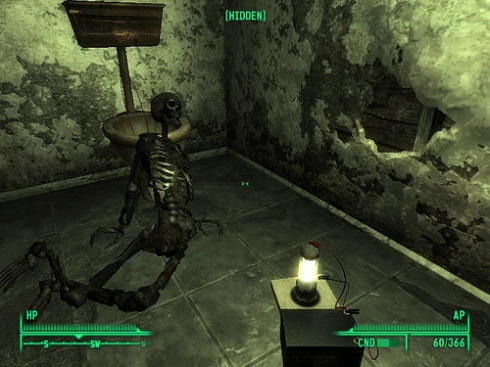It seems that there exists a great divide among those who study and enjoy games. Most gamers may not even know about this rift under the name of ‘ludology vs narratology’ but nonetheless most will have a strong opinion on the matter when confronted with the ideals. People tend to over simplify the debate, in my opinion, by defining the terms quite loosely. I have heard the term ludologists described to mean gamers who prefer the visceral, immediate gratification of game play over the narrative aspect of games as enjoyed by narratologists. However, the definitions that I prefer apply more to actual scholars and researchers who study game theory and design. In that case, narratology refers to the study of games as a form of narrative, therefore subject to more traditional literary theory. The ludology viewpoint then is that games are inherently different to literature and should be analysed differently, with new techniques and theories. To quote some people more knowledgeable than I :
The term narratology had to be invented to unify the works that scholars from different disciplines were doing about narrative
We will propose the term ludology (from ludus, the Latin word for “game”), to refer to the yet non-existent “discipline that studies game and play activities”. Just like narratology, ludology should also be independent from the medium that supports the activity.
Gonzalo Frasca
So, definitions aside, what are my thoughts on the matter? Well it is pretty immediately apparent to me that some form of compromise will have to be reached, given that games clearly span both areas of research! The majority of games tend to have some form of narrative story line, at least since technology has had the capacity to support it (that is to say, many early games skipped any pretense of story because they had no way to present it even if they wanted to!). I think games have tended to move into their own unique area of narrative though, where narrative is experienced or implied through game play.
This more modern style of story telling in games tends towards the ludogists side of the argument, requiring new theories for definition, critique and study. Examples of this style might be the visual storytelling in Fallout 3, where the player happens upon a scene and infers the story of what happened from subtle hints, objects etc. A classic literal example would be finding a skeleton in a bathtub, cradling a toaster.
A similar ”shocking” example of some poor soul who couldn’t handle nuclear apocalypse. Ahem.
To go back to the more simple definition of player types, I think these abstract little touches would probably escape the attention of your average ‘ludologist’ player. They would just see a skeleton in a weird pose and be annoyed that there was no loot for them.
However, I think your average practitioner of classical narratology might have a hard time to analyse that little vignette with their old school methods! There is no doubt in my mind that these little pieces all contribute majorly to the Fallout world and story line. No analysis of the game’s narrative would be complete if it glossed over these touches and dealt only with the main story as told through characters and cut-scenes.
It strikes me that cut-scenes were a major development, but also somewhat of a hindrance, to the evolution of gaming narratives. In the good old days (prepare for major generalisation), it was a suitable way to develop story in a fashion as close to TV or film as possible, while avoiding block after block of text as was the norm for early narrative heavy games. I think it also made for a great reward for finishing a level and as a way to incentivise play. In a time when computer rendered animations were not the norm, it was really cool to get to watch these pre-rendered scenes. They were often reserved for really key plot points or for introducing big bosses, with text providing the main bulk of the story due to the limitation of storage media. Series like Final Fantasy and Zelda spring to mind as examples.
I think developers became complacent though and relied heavily on cut scenes to provide narrative for too long. I reckon the similarity to film and video set up a comfort zone that slowed innovation in games narration. I feel that these older generations of games fall into the more classic field of narratology both by the very nature of their text/video based narratives and because the developers looked to tried and tested narrative styles.
Nowadays, I think technology and society has caught up to us, meaning that rendered cut-scenes are no longer such special and interesting displays of animation to the average player. Your average ludologist style player probably finds such cut-scenes a needless distraction during which they aren’t even playing the damn game! What I find quite ironic, is that some developers have taken to adding ‘quick-time events’ into their cut-scenes, probably to counter that exact sentiment in players. In doing so, I think they are just detracting from the narrative while also aggravating players. I am reminded of when my dog bangs her toy up against my leg, as if to remind me that we’re playing, a fact that I’m very much aware of anyway! People who’ve played the campaign of Battlefield 3 will know very well what I mean.
To conclude this long and rambling post, I will reiterate that I think this debate is just a matter of ‘horses for courses’. I think too much time is wasted arguing these points, time that could be better spent actually researching games, applying theories, experiments or formulating new ones if you think the current ones are inadequate. Perhaps I’ve missed the point of the whole debate but that is my understanding of it. Can’t we all just get along and play Mario Kart together?
P.S Ludologists smell!

